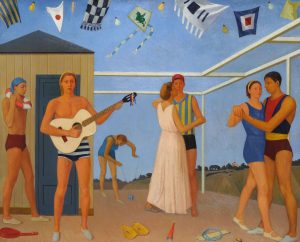Appel à communication : New Leisure for a New Nation. Art and Entertainment in Italy, from Nation-building to Liberation (1861-1945)
Call for Papers : New Leisure for a New Nation. Art and Entertainment in Italy, from Nation-building to Liberation (1861-1945)
November 22-23, 2023. Bibliotheca Hertziana, Rome
Scientific Organization: Giulia Beatrice and Sara Vitacca

Giuseppe Capogrossi, Ballo sul fiume, 1936 circa, oil on canvas, 140 x 172 cm, Palazzo Merulana – Fondazione Cerasi, Rome
The years between unification and Liberation in Italy were fundamental to the formation of a multifaceted but superficially cohesive national identity. Unlike architecture and public sculpture, places and forms of entertainment and socialising were deemed to have little place in forming the new identity. They were considered inessential and even frivolous. But it was precisely in these decades that the cultural tradition of entertainment in Italy underwent a major renewal, and in the process creating new forms that still have lasting effects in the contemporary world. New entertainment opportunities – from café-chantants to amusement parks – actively contributed to the creation and re-creation of the nation’s identities. The success of these new forms of entertainment allowed not only for the consolidation of regional, gender, class and racial identity categories, but also for their transgression and subversion.
Artistic creation was a core part of the development and spreading of Italian leisure culture. We therefore intend to investigate the complex and largely unexplored relationship between art and entertainment. In particular, we are interested in:
- The representation of new forms of entertainment – sports, balls, concerts, fairs, physical activities and parades – in different artistic mediums, from paintings and sculptures to postcards, posters and ephemeral materials.
- Artistic interventions (decoration, temporary installations, ornamental cycles) in spaces dedicated to entertainment (from the baths frescoed by Galileo Chini to futurist cabarets).
- The cultural and anthropological dimension of entertainment through the lens of artists (writings, memoirs, stories, experiences, reconstruction of artistic networks).
The aim of the workshop is to analyse how the relationship between artistic representations and new forms of entertainment contributed to the construction of Italian identities during the nation-building process. Particular emphasis will be placed on aspects related to gender, the exhibited and spectacularised body, race and colonial dynamics, as well as regionalisms and the social and class differences that entertainment has contributed to normalising and/or transgressing. In the decades under consideration, Italy went from being a liberal government to a totalitarian Fascist regime. A central part of this investigation will therefore be an analysis of the tension between freedom and authority and its effects on the political aspects of entertainment culture, and the dialectical relationship between the subjective dimension of experience and that imposed by propaganda.
The workshop is intended to be multidisciplinary in nature. It is open to scholars from art history, visual studies, history of costume and cultural history. Proposals need not be limited to the identification of relevant case studies; where possible they should seek to investigate the social, political and cultural dimensions that case studies reflect.
The workshop is organized within the framework of the research unit Decolonising Italian Visual and Material Culture from Nation-Building to Now of the Bibliotheca Hertziana – Max-Planck-Institut for Art History in Rome. The workshop may be the subject of a publication with selected papers.
We invite researchers to submit proposals for 20-minute papers in either English or Italian. To apply, please send an abstract of no more than 350 words and a short bio (max. 150 words) to both giulia.beatrice@biblhertz.it and sara.vitacca@biblhertz.it by 30th March 2023.
The Bibliotheca Hertziana – Max Planck Institute for Art History will cover travel and accommodation costs for the speakers according to the German Federal law for travel costs refund (BRKG).

Leave a Reply
You must be logged in to post a comment.